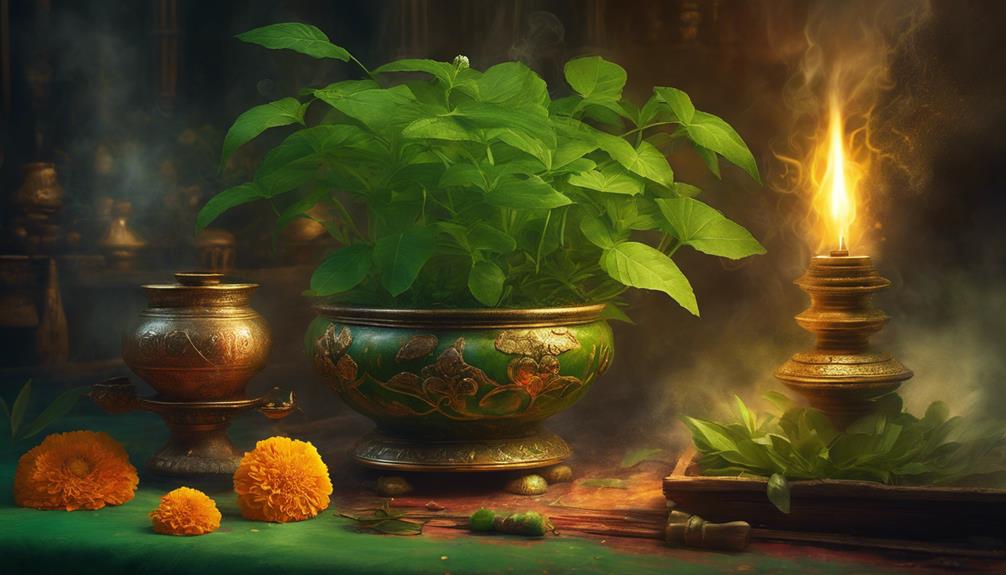The Tulsi plant holds immense significance in Hindu worship, tracing back to ancient scriptures and traditions. Known as Holy Basil, it symbolizes purity, auspiciousness, and divine connections with the gods. The plant is considered an earthly manifestation of the goddess Tulsi, revered for its representation of devotion and protection. In Hindu rituals, the Tulsi plant symbolizes purity, with its leaves used in garlands to show reverence and bring blessings. Offering prayers to Tulsi signifies respect, gratitude, and a deep spiritual connection with divinity.
Its medicinal properties add to its importance, being valued for antibacterial, antifungal, and anti-inflammatory benefits. Tulsi stands as a symbol of spiritual purity and sanctity in Hindu traditions, embodying the essence of cleanliness and sacredness. The Tulsi plant's profound significance is deeply rooted in Hindu beliefs and practices, showcasing its rich history and symbolic importance in worship.
Table of Contents
Key Takeaways
- Tulsi is revered in Hinduism as Holy Basil, symbolizing purity and auspiciousness.
- It is considered a sacred plant embodying divine connections and protection.
- Tulsi leaves used in worship represent reverence, blessings, and spiritual purification.
- The plant offers medicinal benefits like boosting immunity and promoting well-being.
- Rituals like Tulsi Vivah and Tulsi Pujan signify the plant's significance in Hindu worship practices.
Historical Origins of Tulsi Plant Worship
The historical origins of Tulsi plant worship can be traced back to ancient Hindu scriptures and traditions. Tulsi, also known as Holy Basil, holds immense cultural significance in Hinduism. Its reverence dates back thousands of years, with mentions in texts like the Puranas and the Vedas. Tulsi is considered a sacred plant that embodies purity and auspiciousness in Hindu rituals and daily life.
Ritual practices surrounding the Tulsi plant are deeply ingrained in Hindu religious symbolism. Devotees often worship and care for the Tulsi plant as a way to honor the goddess Tulsi and seek blessings for health, prosperity, and spiritual growth. Planted near homes or temples, the Tulsi plant is central to various ceremonies and festivals, symbolizing devotion and protection.
Through the ages, the Tulsi plant has remained a symbol of faith and devotion in Hindu worship, reflecting the rich tapestry of cultural and religious traditions that continue to shape its significance in modern-day practices.
Mythological Significance in Hindu Scriptures
Embedded within the sacred narratives of Hindu scriptures lies a profound mythological significance surrounding the Tulsi plant. Mythological tales depict the Tulsi plant as embodying a divine connection with the gods. According to these stories, Tulsi is believed to be an earthly manifestation of the goddess Tulsi, who's a devoted worshiper of Lord Vishnu.
The plant's significance is deeply rooted in its symbolic representation of purity, devotion, and protection. In Hindu scriptures, Tulsi is often revered for its role in religious ceremonies and rituals. It's said that the plant's presence can sanctify a space and purify the surroundings, making it an essential element in various religious practices.
The mythological tales surrounding the Tulsi plant emphasize its sacred nature and highlight its importance in Hindu worship. Through these narratives, believers are reminded of the plant's spiritual significance and the virtues it embodies in the domain of religious devotion.
Tulsi Plant as a Symbol of Purity

The Tulsi plant stands as a symbol of spiritual purity in Hindu traditions, embodying sacredness and reverence. It's revered for its role in purification rituals and symbolizes the essence of cleanliness and sanctity in worship practices.
Embracing the Tulsi plant signifies a deep respect for purity and a connection to the divine through its auspicious presence.
Symbol of Spiritual Purity
Symbolizing spiritual purity, the Tulsi plant holds a revered place in Hindu worship rituals. Its significance goes beyond physical presence, embodying spiritual devotion and aiding meditation practices.
The Tulsi plant is believed to purify the mind and body, creating a sacred atmosphere conducive to inner reflection and connection with the divine. Hindus often use Tulsi leaves in their prayers and ceremonies as a way to enhance their spiritual experience.
Additionally, the Tulsi plant is known for its healing properties and is utilized in traditional medicine practices. The plant's aromatic leaves are used for their medicinal value, promoting overall well-being and vigor.
Through its symbolic representation of purity and healing properties, the Tulsi plant remains a cherished element in Hindu worship.
Sacred Plant in Worship
In exploring the significance of the Tulsi plant in Hindu worship, investigate its role as a sacred symbol of purity, bridging the physical and spiritual domains with its profound essence.
The Tulsi plant holds deep botanical symbolism, symbolizing auspiciousness and divine presence. Its aromatic leaves are believed to purify the mind and body, making it an essential element in Hindu rituals.
The plant's cultural traditions date back centuries, with devotees revering it as a manifestation of the goddess Tulsi. Its presence in homes and temples signifies protection and sanctity.
The Tulsi plant isn't just a botanical entity but a revered symbol that encapsulates the essence of purity and spirituality in Hindu worship practices.
Purification in Hinduism
Within Hinduism, purification rituals encompass a profound essence, with the Tulsi plant revered as a symbol of purity that transcends the physical and spiritual domains.
Ritualistic practices in Hinduism often involve spiritual cleansing, where devotees seek purification of the body, mind, and soul. The Tulsi plant plays a significant role in these rituals, as its presence is believed to ward off negative energies and promote positivity.
Hindus often incorporate Tulsi leaves in various ceremonies and offerings to deities as a means of purifying the environment and invoking blessings. The act of cultivating and caring for the Tulsi plant is considered a form of spiritual discipline that aids in personal purification.
Its fragrant leaves symbolize purity and devotion, making it a central element in Hindu worship practices related to purification.
Medicinal and Ayurvedic Benefits

The Tulsi plant, revered in Hindu worship, holds significant medicinal and Ayurvedic benefits that have been valued for centuries. Its healing properties are deeply intertwined with its spiritual connection in Hindu culture. Tulsi is known for its antibacterial, antifungal, and anti-inflammatory properties, making it a versatile herb in traditional remedies. The leaves of the Tulsi plant are rich in antioxidants and essential oils, which contribute to its holistic healing properties.
In Ayurveda, Tulsi is considered a powerful adaptogen, helping the body adapt to stress and maintain balance. It's often used to boost the immune system, improve respiratory health, and promote overall well-being. Tulsi leaves are commonly consumed as herbal tea or used in various formulations to treat a range of ailments.
The Tulsi plant's medicinal significance goes beyond physical health; it's also believed to have a calming effect on the mind and spirit. Its aromatic fragrance is said to purify the surroundings and create a sense of peace and tranquility.
Rituals and Ceremonies Involving Tulsi
As you explore the rituals and ceremonies involving the revered Tulsi plant in Hindu worship, you'll encounter a variety of practices that highlight its significance.
These include offerings made to the Tulsi plant, the creation and wearing of garlands made from its leaves, and the recitation of prayers dedicated to the plant.
Each of these rituals plays an important role in demonstrating devotion and reverence towards the Tulsi plant in the Hindu faith.
Tulsi Plant Offerings
In Hindu worship practices, offering rituals and ceremonies involving the Tulsi plant hold significant importance. The Tulsi plant isn't only revered for its spiritual significance but also for its practical uses. Many devotees cultivate Tulsi plants in their homes, engaging in Tulsi plant gardening and growing as a form of devotion.
Apart from its religious value, the Tulsi plant is known for its medicinal properties and is utilized in various herbal remedies and rituals. The leaves of the Tulsi plant are used in offerings to deities, symbolizing purity and auspiciousness. The act of offering Tulsi leaves during prayers is believed to bring blessings and protection. These offerings create a spiritual connection between the devotee, the divine, and nature.
Tulsi Plant Garlands
Wearing garlands made from the sacred Tulsi plant is a revered practice in Hindu rituals and ceremonies, symbolizing purity and devotion. Tulsi plant decorations hold significant cultural value, adorning homes and temples during religious ceremonies.
These garlands, intricately woven with Tulsi leaves, are symbols of reverence and are believed to bring blessings and protection. In religious practices, offering Tulsi garlands to deities is considered a gesture of utmost respect and devotion.
The fragrance of the Tulsi plant is said to purify the surroundings, making the garlands not only aesthetically pleasing but spiritually enriching. The tradition of using Tulsi garlands dates back centuries, illustrating the deep-rooted symbolism and importance of the Tulsi plant in Hindu worship.
Tulsi Plant Prayers
The significance of Tulsi plant prayers in Hindu rituals and ceremonies extends beyond mere tradition, embodying a profound spiritual connection with divinity and devotion. Tulsi is revered not only for its healing properties but also for its ability to purify the mind, body, and soul.
In cultural traditions, offering prayers to Tulsi is a daily ritual that symbolizes respect and gratitude towards the plant's sacred nature. Hindus believe that Tulsi is a manifestation of the goddess Lakshmi and that prayers offered to it bring blessings of prosperity and well-being.
Tulsi Vivah: The Sacred Marriage Ceremony
During the Tulsi Vivah ceremony, the sacred marriage between the Tulsi plant and Lord Vishnu is ceremonially celebrated in Hindu tradition. This auspicious ceremony symbolizes the sacred union between the plant, revered as an earthly form of the goddess Lakshmi, and Lord Vishnu, the preserver in the Hindu trinity. The ritual holds deep significance, emphasizing the divine connection between nature and the divine.
Tulsi Vivah typically takes place on the 11th day of the bright fortnight of the lunar month of Kartik, which usually falls in October or November. The ceremony involves the ceremonial wedding of the Tulsi plant to a sacred object representing Lord Vishnu, such as a sacred stone or an image of the deity. The marriage is conducted with traditional Vedic rites and mantras, mirroring a human wedding ceremony.
Devotees believe that participating in the Tulsi Vivah ceremony brings blessings, prosperity, and spiritual well-being. The ritual is a beautiful expression of devotion and reverence for nature and the divine, fostering a deeper connection with the divine energies that the Tulsi plant and Lord Vishnu embody.
Tulsi Pujan: Worship Practices and Rituals

In Hindu worship, observing Tulsi Pujan entails a series of intricate rituals and practices that hold profound spiritual significance. Ritualistic practices during Tulsi Pujan include the offering of water, flowers, and incense to the Tulsi plant, symbolizing devotion and purity. Sacred ceremonies are performed where prayers are recited, and lamps are lit to honor the plant's divine essence. Worship traditions dictate that Tulsi leaves aren't only offered to deities during prayers but are also consumed for their medicinal and spiritual benefits.
Symbolic rituals play an important role in Tulsi Pujan, with each action carrying deep meaning. Placing the Tulsi plant in the center of the courtyard or home symbolizes the presence of the divine, fostering a sacred environment. Watering the plant daily is seen as nurturing one's spiritual growth and connection to the divine. These practices not only demonstrate reverence for the Tulsi plant but also serve as a reminder of one's commitment to spiritual values and traditions.
Tulsi Mantra and Chanting Practices
Engage in the sacred practice of Tulsi Mantra recitation and chanting to deepen your spiritual connection and invoke divine blessings. Tulsi Mantra chanting holds profound significance in Hindu worship, offering a gateway to spiritual growth and inner peace. The rhythmic recitation of Tulsi Mantras not only brings peace to the mind but also helps in establishing a deeper connection with the divine.
The benefits of chanting Tulsi Mantras are manifold. Regular chanting can help in calming the mind, reducing stress, and enhancing concentration during meditative practices. The healing properties of Tulsi are believed to be amplified through the power of mantra repetition, promoting overall well-being and harmony within the body, mind, and spirit.
Incorporating Tulsi Mantra chanting into your daily spiritual routine can serve as a powerful tool for self-transformation and spiritual evolution. Embrace this ancient practice with reverence and sincerity, allowing the divine vibrations of the Tulsi Mantra to guide you on your spiritual journey.
Spiritual Significance in Hindu Beliefs

In essence, delving into the spiritual significance embedded within Hindu beliefs unveils a profound connection to divine energies and universal truths. Within Hinduism, spiritual practices and religious beliefs are deeply intertwined, aiming to foster a harmonious relationship with the divine.
The spiritual significance of the tulsi plant in Hindu beliefs is multifaceted. It symbolizes purity, auspiciousness, and devotion, serving as a tangible representation of one's reverence towards the divine. The act of nurturing and caring for the tulsi plant is considered a sacred duty, reflecting the devotee's commitment to spiritual growth and inner transformation.
Within Hindu beliefs, the tulsi plant is believed to be an embodiment of the goddess Lakshmi, the goddess of wealth and prosperity. By integrating the tulsi plant into daily spiritual practices such as puja (worship) and meditation, individuals seek blessings for abundance and well-being. Additionally, the aromatic fragrance of the tulsi leaves is thought to purify the mind and soul, aiding in spiritual practices and enhancing one's connection to the divine.
Altogether, the tulsi plant holds a revered place in Hindu beliefs, serving as a conduit for spiritual growth and divine grace.
Tulsi Plant in Modern Hindu Worship
Have you ever considered the evolving role of the Tulsi plant in contemporary Hindu worship practices? In modern Hindu worship, the Tulsi plant continues to hold immense cultural significance. It isn't merely a plant but a symbol of devotion and purity in today's religious customs.
Modern practices surrounding the Tulsi plant often involve nurturing it with care and reverence. Many Hindu households have a designated place for the Tulsi plant, where daily rituals and prayers are offered. The plant is seen as a sacred presence that brings blessings and protection to the home.
The contemporary relevance of the Tulsi plant lies in its ability to connect individuals to their spiritual roots. Despite changing lifestyles and societal norms, the reverence for the Tulsi plant remains strong. Its presence in Hindu rituals serves as a reminder of the deep-seated traditions and values that continue to guide many in their faith.
Frequently Asked Questions
Can Tulsi Be Grown Outside of India, and Is It Still Considered Sacred in Other Cultures?
Yes, you can grow tulsi outside of India, and it is still considered sacred in other cultures. Many believe in its cultural significance and utilize its medicinal properties worldwide, connecting spiritually and benefiting from its healing attributes.
Are There Any Specific Rules or Guidelines for Caring for a Tulsi Plant in Order to Maintain Its Spiritual Significance?
To maintain the spiritual significance of a Tulsi plant, guarantee regular watering to keep the soil moist but not waterlogged. Prune regularly to encourage growth and maintain shape. Plant in well-draining soil, provide ample sunlight exposure for healthy growth.
Are There Any Specific Rituals or Ceremonies That Involve the Use of Tulsi Leaves or Plants in Addition to Worship Practices?
In Hindu worship, tulsi leaves play an essential role in various ritual practices. They are used in ceremonies, prayers, and offerings as a symbol of devotion and purity. The cultural significance of tulsi extends beyond worship, resonating deeply in Hindu traditions.
Are There Any Specific Beliefs or Superstitions Associated With the Presence of a Tulsi Plant in a Hindu Household?
In Hindu households, the presence of a tulsi plant is believed to bring blessings, protection, and auspiciousness. It is considered sacred and symbolizes devotion to deities. Many traditions, superstitions, and practices revolve around caring for tulsi.
Are There Any Traditional Stories or Folklore That Explain the Connection Between Tulsi and Specific Deities in Hindu Mythology?
In Hindu mythology, the tulsi plant holds sacred symbolism and mythological connections. It is believed to be dear to deities like Vishnu and Lakshmi, embodying purity and divine associations in religious practices and rituals.
Conclusion
To sum up, the tulsi plant holds immense significance in Hindu worship due to its historical origins, mythological importance, symbolism of purity, medicinal benefits, and spiritual significance.
It's revered in rituals and ceremonies, worshipped with devotion, and believed to bring blessings and protection to those who honor it.
The tulsi plant continues to play a crucial role in modern Hindu worship, serving as a symbol of reverence and connection to divine energies.